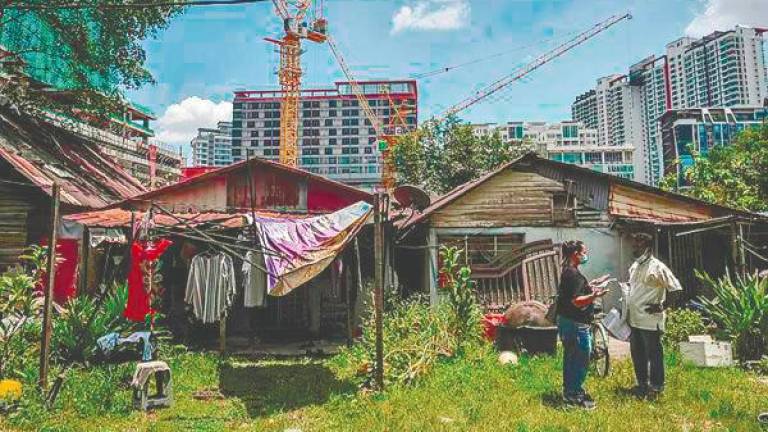NO management staff had resigned because of the new buffalo fruit transport system that was imposed by the new general manager Leslie Davidson for Pamol Estate near Kluang. Nonetheless, there was a collective effort to resist among us.
The first person who tried to shoot down the idea was David Marsh. He had studied agriculture in Lincolnshire and joined the plantation business through his mother’s connection with Unilever’s Plantations group in London. He came to Sabah to work for Davidson.
Marsh had a knack for getting things done swiftly. He quickly learnt to speak Malay with a Sabah accent.
The company had plans to increase his exposure, which led to his transfer to Kluang. Davidson expressed regret at losing him.
In Kluang, Marsh would assign the daily tasks. He was not interested in promotions. He often spent time in town with businessmen at the Kluang railway station coffee shop.
In the evenings, he frequented the Paramount nightclub or the Blue Swan in Batu Pahat.
Patrons at the Blue Swan included loggers, and during one particular visit, Marsh found that they were using buffaloes to haul logs. Impressed by their efficiency, he arranged a transaction and had two buffaloes delivered to the estate.
Pamol Estate senior divisional manager N.S. Sankar covered the cost after Marsh assured him that the buffaloes had already been trained.
However, shortly after their arrival, both the buffaloes died. Sankar promptly reported the incident to Davidson without offering any comments.
In response, Davidson convened a meeting at Sankar’s office without delay. During the meeting, he reiterated his commitment to allocate funds until the estate fully embraced the new system.
We had no choice but to comply, however, sourcing buffaloes proved challenging. After exhausting resources in Johor, our buyers scoured Kedah and even Kelantan to procure them.
After two weeks of training, the buffaloes exhibited varying levels of obedience. However, one in particular consistently refused to budge when the sun reached a certain angle in the sky.
Observing the situation, Davidson remarked: “Begin from the far end and progress towards home. You will witness how quickly they can move.”
Eventually, he agreed to let us start a breeding herd, with over 100 female buffaloes and four studs chosen for their body conformation and good temperament.
As expected, the two-year-old bulls worked better and became pets to the owners. Consequently, more workers showed keen interest in buying the buffaloes.
Davidson suggested that our achievement should be publicised. He tasked one of the managers from Sabah, David Wan, to present a paper at an oil palm conference in Kuala Lumpur. He was pleased with the response.
“I am impressed by Wan’s presentation. I appreciate the new ideas coming from Sabah. The buffalo is better than a tractor. It gains value every year, aids in weeding and even provides fertiliser. Unlike a tractor, which becomes obsolete with age, the buffalo can be turned into satay.”
True to Davidson’s nature, he had a tendency to exaggerate, but after several months, other planters began to take notice of Pamol.
In 1976, I hosted over 200 visitors, including the late Tan Sri Lee Loy Seng, the founder of Kuala Lumpur-Kepong Bhd. Soon, managers across Paloh were adopting the system as well.
Seng’s estates prominently displayed numerous warning signs cautioning against speeding lorries.
Their signboards read in bold letters: “SLOW BUFFALOES”.
Marsh smiled and quipped: “They should have bought from us if they wanted faster buffaloes.”
He shared the same sense of humour as Davidson, and I saw how, during dinner parties, they would exchange playful banter and jokes about each other.
Davidson often regaled us with tales of his misadventures, his narratives peppered with exaggerations along the way.
In one incident, his wife Olive overheard him and asked what he was talking about.
“I was talking about my travels in Africa and the night I slept with Miss Nigeria,” he told her.
“You mean she was on the same plane,” quipped his wife.
“Yes,” he replied sheepishly.
“And, she was asleep. She was not even in the same row,” his wife corrected him.
That brought him back to reality.
Olive also had a knack for providing us with some relief from work pressure. Meetings with Davidson could often drag on.
He was brimming with ideas, and at times he would instruct his secretary Mrs Wan not to put through any calls except from his wife, whom Davidson affectionately referred to as “Her Majesty, the Queen of England”.
Of course, the “queen” never called until it was five o’clock, prompting Davidson to respond, “Yes, dear, I’ll be home for tea.”
When Davidson left, we would call it a day.
Before long, Marsh decided to leave. He had succeeded in persuading most of his workers to use the buffalo system.
One day I noticed a book in Spanish in his living room.
“I am going to Surinam. Many Javanese live there, and they may start a plantation. If I do not find it interesting, I may go to Mexico. Some parts may be good for oil palm. I think I have done what I can here,” Marsh said.
Davidson was satisfied with his record, and during a meeting chaired by Sankar, he joined us and thanked us for our progress with the buffaloes before touching on another subject.
“I am worried about your costs. They are increasing.”
He pointed out that Marsh was the only one effectively controlling costs on weeding per hectare. This made the rest of us look bad.
At that moment, Sankar intervened to correct Davidson. “That is because he does not do any weeding.”
However, Marsh interjected bluntly. “My fields do not have to look like the Kuala Lumpur Lake Gardens. I try to save wherever I can.”
Sankar retaliated: “All you do every day is supervise pollination work.”
We knew there was some truth to that. The teams involved in the pollination process often comprised of some of the prettiest girls from Yap Tau Sah new village near Kluang.
On cue, the phone rang precisely at five, prompting Davidson to glance at his watch and rise to leave.
“Continue with your buffalo system, even on the hills. Then, we will discuss assisted pollination. It can save us cost and lead to larger bunches. If the idea works, we may no longer require pollination workers. I will update you next week after my meeting in Kuala Lumpur.”
The writer has extensive experience in the management of oil palm plantations. Comments: letters@thesundaily.com










